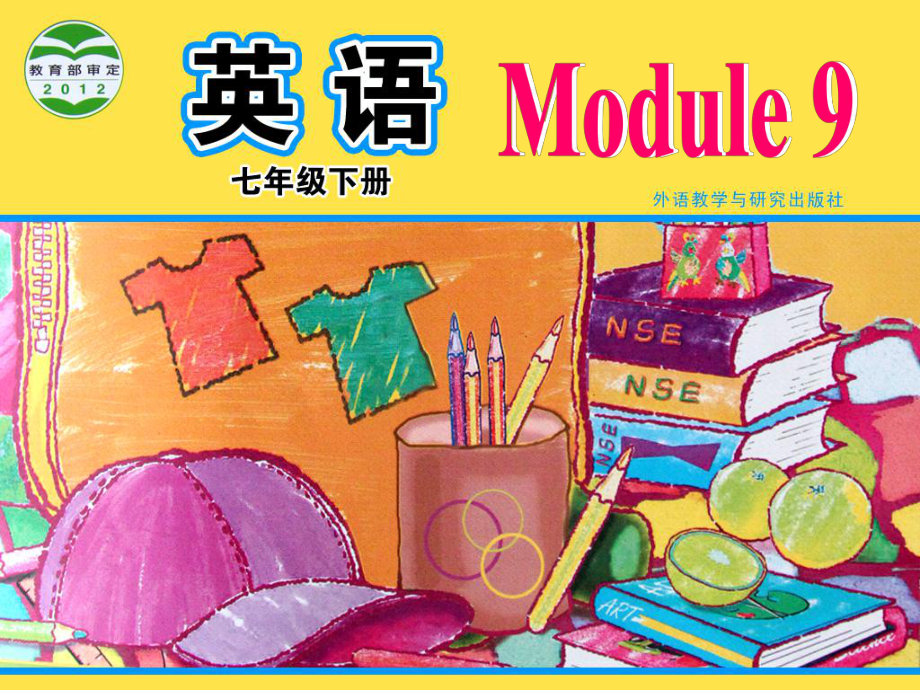《外研版初中英語七年級(jí)下冊(cè)Module 9Unit 3 Language in use課件》由會(huì)員分享�,可在線閱讀,更多相關(guān)《外研版初中英語七年級(jí)下冊(cè)Module 9Unit 3 Language in use課件(41頁珍藏版)》請(qǐng)?jiān)谘b配圖網(wǎng)上搜索��。
1、1. successful She is a successful writer.2. marry Please marry me.3. become Mark Twain became very famous writer in the 1860s.4. find out Please find out the answer to the question. 5. die death dead dyingyoung adj. 年輕的年輕的young 是形容詞�����,意思是是形容詞�����,意思是“年輕的年輕的”�,反義詞是反義詞是 old “年老的年老的”。即:����。即: young old 年輕的年輕的 反義
2、詞反義詞 年老的年老的例如:例如:He is very young but his grandfather is old.他很他很年輕年輕����,但他的爺爺,但他的爺爺老了老了���。你弄懂了嗎��?你弄懂了嗎����?你真聰明!你真聰明����!Language practiceHe left school and began work at the age of twelve.But he took the name Mark Twain and became very famous in the 1860s.He wrote about thirty-eight plays.In 1599 the company bu
3、ilt the Globe Theatre.一般過去時(shí)(一般過去時(shí)(3)動(dòng)詞過去式規(guī)則的��,在其后直接加動(dòng)詞過去式規(guī)則的��,在其后直接加-ed�,不���,不規(guī)則的需要單獨(dú)記憶�����。規(guī)則的需要單獨(dú)記憶��。例如:例如:We left at nine oclock in the morning. 我們是早上我們是早上9點(diǎn)鐘離開的����。點(diǎn)鐘離開的���。They swam in the swimming pool and had a good time. 他們?cè)谟斡境乩镉斡?,玩得很開心。他們?cè)谟斡境乩镉斡?�,玩得很開心�。He wrote some postcards and sent some emails. 他寫了一些明信片,
4��、還發(fā)了一些電子郵件����。他寫了一些明信片,還發(fā)了一些電子郵件�����。bewas/were是是leaveleft離開離開buybought買買meet met遇到遇到comecame來來readread讀讀dodid做做seesaw看見看見getgot到達(dá)到達(dá)sendsent發(fā)送發(fā)送gowent去去spendspent 花費(fèi)花費(fèi)havehad吃吃swimswam 游泳游泳writewrote寫寫taketook帶走帶走 不規(guī)則動(dòng)詞的一般過去時(shí)的否定形式:不規(guī)則動(dòng)詞的一般過去時(shí)的否定形式:We didnt leave at nine oclock in the morning. 我們不是早上我們不是早上9點(diǎn)
5����、鐘離開的。點(diǎn)鐘離開的���。They didnt swim in the swimming pool. They didnt have a good time. 他們沒在游泳池里游泳���。他們玩得不開心。他們沒在游泳池里游泳���。他們玩得不開心�����。He didnt write postcards and didnt send emails. 他沒有寫一些明信片����,也沒發(fā)一他沒有寫一些明信片,也沒發(fā)一些電子郵件�。(些電子郵件。(注意:注意:?。┮话阋蓡栃问郊捌淇稀⒎穸ɑ卮穑阂话阋蓡栃问郊捌淇?���、否定回答:Did you leave at nine oclock in the morning?你們是早上你們是早上9點(diǎn)
6����、鐘離開的嗎?點(diǎn)鐘離開的嗎�?Yes, we did. / No, we didnt. 是的,我們是����。是的����,我們是�。/不,我們不是�����。不����,我們不是。Did they swim in the swimming pool?他們?cè)谟斡境乩镉斡玖藛??他們?cè)谟斡境乩镉斡玖藛幔縔es, we did. / No, we didnt. 是的���,他們游了��。是的�,他們游了��。/不�,他們沒游。不��,他們沒游。一般疑問形式及其肯�����、否定回答:一般疑問形式及其肯���、否定回答:Did he have a good time? 他玩得開心嗎�����?他玩得開心嗎���?Yes, he did. / No, he didnt. 是的,開心�。是的,開心�。
7����、/ 不,不開心����。不���,不開心。Did he write any postcards and send any emails?他寫了一些明信片他寫了一些明信片, 還發(fā)了一些電子郵件還發(fā)了一些電子郵件嗎���?嗎�����?Yes, he did. / No, he didnt. 是的�����,他寫了發(fā)了�����。是的���,他寫了發(fā)了。 / 不���,他沒寫沒發(fā)�。不,他沒寫沒發(fā)���。根據(jù)題后括號(hào)內(nèi)的要求完成下列各題��。根據(jù)題后括號(hào)內(nèi)的要求完成下列各題����。1. Mary will come here at 10:00.(用(用yesterday改寫句子)改寫句子) Mary _ here at 10:00 yesterday.2. I met Lis
8�����、a at the school gate yesterday morning.(改為否定句)(改為否定句) I _ Lisa at the school gate yesterday morning.came didnt meet 3. Bill wrote an email three hours ago.(改為一般疑問句)改為一般疑問句) _ Bill _ an email three hours ago?Didwrite你都弄懂了嗎�����?你都弄懂了嗎�����?你真聰明��!你真聰明���!Complete the sentences about Bettys life.1. Betty _ (be born)
9、 in Quincy.2. She _ (go) to John Adams Primary School.3. She _ (be) happy in Quincy.4. She _ (have) lots of friends there.5. She _ (come) to China in 2008.was bornwentwashaddidnt comeComplete the passage with the correct form of the words.When my father was young, he (1) _ (not have) much money. He
10���、(2) _ (begin) work at eight oclock and (3) _ (leave) at five. didnt havebeganleftWhen he (4) _ (get) home, he always (5) _ (read) a book. In the evening he (6) _ (go) to the park and (7) _ (have) a good time.gotreadwenthadComplete the conversation with the correct form of the words from the box. You
11�、 can use the words twice.Tony: What time did you (1) _ school every day when you were a boy?Tonys dad: I (2) _ at about five oclock, I think.Tony: And what time did you (3) _ home?Tonys dad: Oh, I (4) _ home about half an hour after that, at half past five. leaveleftgetgotTony: Did you (5) _ a lot o
12、f homework?Tonys dad: Yes, I (6) _.Tony: Did you (7) _ to play football when you were at school?Tonys dad: No, I (8) _ after you were born.dodidbeginbeganComplete the passage with correct form of the words from the box. Deng Yaping was born in 1973 in Zhengzhou, China. She (1) _ playing table tennis
13��、 at five. She was only fifteen when she won her first match for China. She (2) _ the National Team in 1988. Deng won Olympic gold four times and she (3)_ famous all over the world. joinedbecamestartedAt the age of twenty-four, Deng Yaping (4) _ the National Team and became a student. She (5) _ very
14����、hard. She then (6) _ to England and studied there.leftworkedwentRead the passage, tick true (T) or false (F).Stratford-upon-Avon is famous because it is the birthplace of Shakespeare.Stratford is a modern town.You can see Shakespeares plays at the Royal Shakespeare Company Theatre.TFTWriting about p
15、eople in the pastFind out about your parents or grandparents lives when they were young.1. Where did you live?2. What did you often watch?3. What games did you play?4. When did you get married?5. How did you travel?Now make notes.Write a timeline.Write notes on the timeline.Write a paragraph about t
16�����、heir lives.Write the paragraph.Do some drawings.Show your paragraph to the whole class.1.1.把你的短文和同桌交換閱讀并檢把你的短文和同桌交換閱讀并檢查���、改正錯(cuò)處�。查���、改正錯(cuò)處���。2.2.讀你的短文給全班同學(xué)聽。讀你的短文給全班同學(xué)聽��。一、選擇題�����。一�����、選擇題���。1. Last week Sue _.A.will see a movie B. saw a movie C. see a movie2. Yesterday Mary _. A.will wash the dishes B. wash the dish
17�����、es C. washed the dishes3. Where _ you last night? I was at home. A. am B. were C. was4. Did you visit a friend yesterday? Yes, _. A. I did B. I do C. I was二����、請(qǐng)用正確動(dòng)詞形式填空����。二、請(qǐng)用正確動(dòng)詞形式填空���。1. I _ (have) an exciting party last weekend.2. _ she _ (practice) her guitar yesterday? No, she _.3. What _ Tom _ (do) on Saturday evening?hadDid practicedidntdiddo4. They all _ (go) to the mountains yesterday morning.5. She _ (not visit) her aunt last weekend. She _ (stay) at home and _ (do) some cleaning.wentdidnt visitstayeddidReview and recite the important points of Module 9. 復(fù)習(xí)并記憶模塊復(fù)習(xí)并記憶模塊9 的重點(diǎn)內(nèi)容���。的重點(diǎn)內(nèi)容。
 外研版初中英語七年級(jí)下冊(cè)Module 9Unit 3 Language in use課件
外研版初中英語七年級(jí)下冊(cè)Module 9Unit 3 Language in use課件

